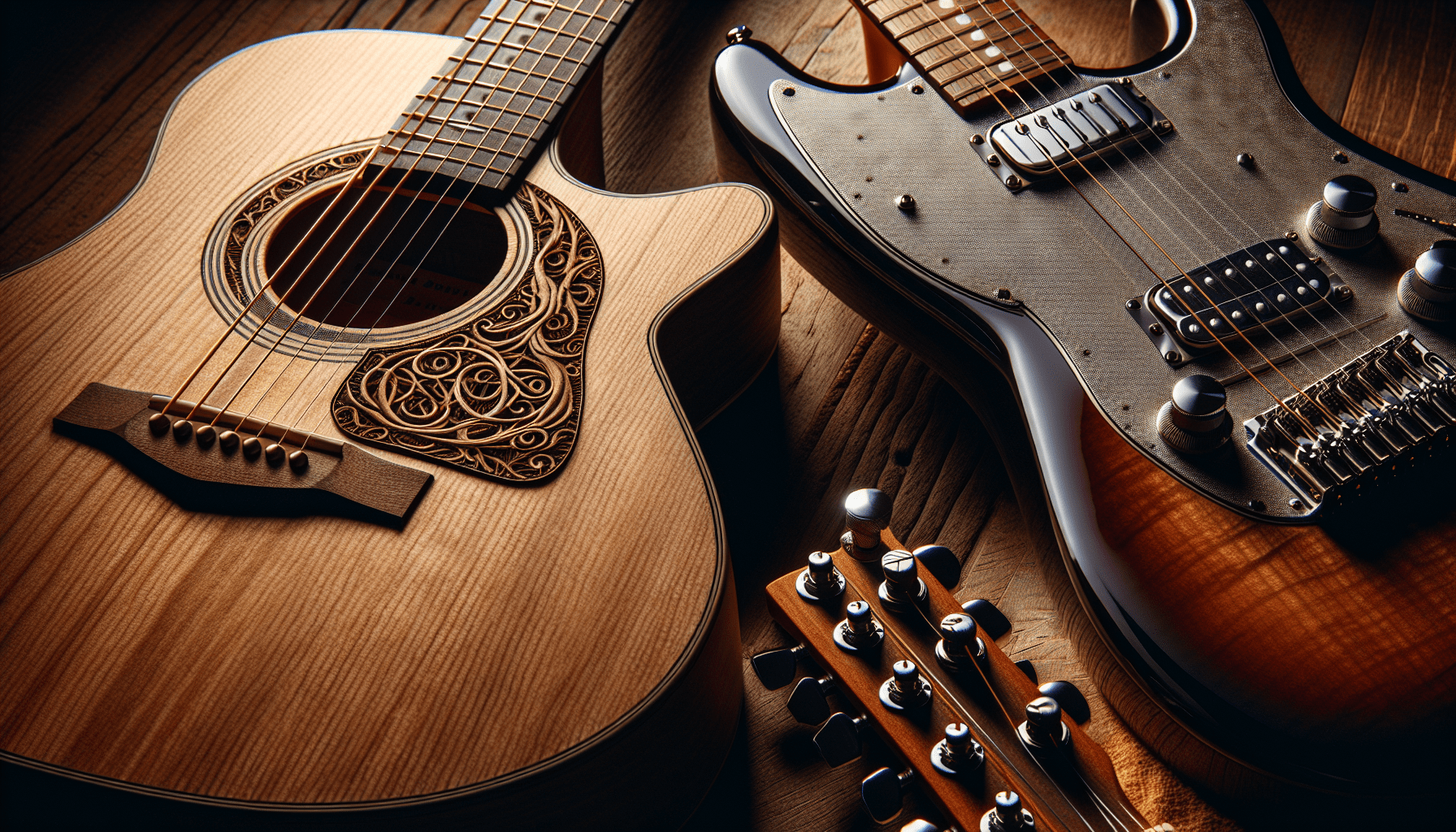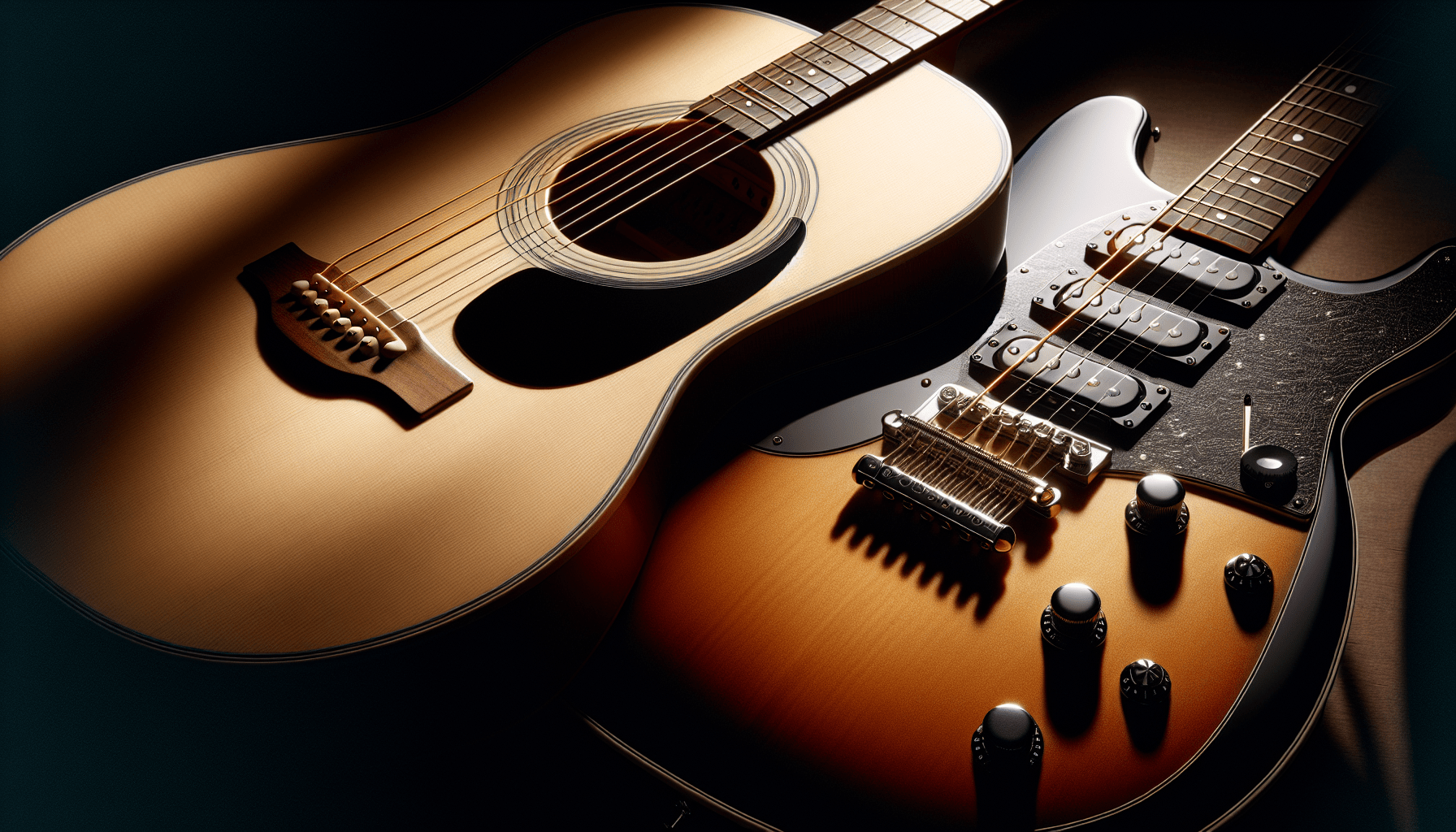Have you ever wondered whether the acoustic guitar is easier to learn than the electric guitar? It’s a common question, especially for beginners who are unsure of where to start. In fact, it’s a topic that has sparked many debates among musicians, teachers, and enthusiasts alike. Let’s take a look at the key differences between these two types of guitars and you’ll walk away with a clearer idea of what might suit you best.
Getting to Know the Guitars
Before diving deeper into the ease of learning, it’s essential to understand what makes acoustic and electric guitars unique.
Acoustic Guitar
The acoustic guitar produces sound through the vibration of its strings, which is then amplified by the body of the guitar itself. This type is typically used in genres like folk, country, and classical music. With no need for an amplifier, you can just pick up and play almost anywhere.
Key Features of Acoustic Guitar:
| Feature | Description |
|---|---|
| Sound Production | Natural sound amplification through the guitar body. |
| Construction | Generally made of wood with a hollow body. |
| Portability | No additional equipment like amplifiers needed. |
| String Type | Usually steel or nylon strings. |
Electric Guitar
The electric guitar relies on electronic amplification. The strings’ vibration is picked up by electronic sensors (pickups) and converted into electrical signals, which are then converted back into sound through an amplifier. The electric guitar is a staple in rock, blues, and other contemporary genres.
Key Features of Electric Guitar:
| Feature | Description |
|---|---|
| Sound Production | Relies on electronic pickups and amplifiers. |
| Construction | Generally solid or semi-hollow body, often made of wood. |
| Portability | Requires an amplifier and cables, limiting portability. |
| String Type | Typically steel strings which are thinner than those on acoustics. |
Starting Out: The Beginner’s Perspective
When considering whether an acoustic guitar is easier than an electric guitar, it’s important to think about the beginner’s perspective and what they go through.
The Acoustic Experience
For rookies, starting with an acoustic guitar has its merits.
- Simplicity: One of the main advantages is its standalone nature. Without the need for an amplifier or cables, you can focus solely on your playing. There’s less to worry about in terms of gear.
- String Tension: Acoustic guitars typically have higher string tension, making it feel tougher on your fingers, especially at the beginning. Think of it as a form of resistance training; it builds finger strength and dexterity over time.
- Sound and Feedback: The sound is directly influenced by how you play. There’s no electronic wizardry involved, giving you immediate, unfiltered feedback about your technique.
The Electric Experience
On the flip side, starting with an electric guitar comes with its own set of considerations:
- Amplification and Effects: The requirement for an amplifier might seem like a hassle, but it opens a plethora of possibilities with effects and sound manipulation. It’s like having a magic wand for sound.
- Ease on Fingers: Electric guitars usually have lighter string tension and lower action (the distance between the string and the fret), making it generally easier to press down the strings. Your fingers will thank you, at least in the beginning stages.
- Learning Curve: While the technicality of setting up the gear might seem daunting, some find it stimulates their interest and keeps them engaged.

Technical Aspects and Skill Development
The technical aspects and skill development potential for both acoustic and electric guitars play a critical role in your learning journey.
Acoustic Guitar Technicalities
With acoustic guitars, you often focus on techniques that emphasize clear, precise playing:
- Chord Strumming: Acoustic guitars are great for learning basic chords and strumming patterns, providing a solid foundation.
- Fingerpicking: An essential skill for acoustic guitarists. It nurtures finger independence and agility.
- Rhythm and Timing: Acoustic playing heavily relies on maintaining steady rhythm and proper timing, essential for playing in a group setting.
Electric Guitar Technicalities
Electric guitars have their own set of techniques that can be highly engaging:
- Power Chords: Simplified chords that are easier to play, helping you get into the groove of rock and metal genres quickly.
- Lead Playing and Bends: Electric guitars allow for greater flexibility with techniques like string bends, slides, and vibrato—perfect for solos.
- Effects and Pedal Play: Getting accustomed to using effects pedals introduces you to the vast sonic possibilities, keeping the learning process exciting and versatile.
Practical Considerations
When deciding if an acoustic guitar is easier than an electric guitar, practical considerations often come into play.
Cost and Investment
Your budget can significantly influence your decision:
- Acoustic: Typically, you can get a decent acoustic guitar for a lower initial cost since you don’t need to invest in an amplifier and other accessories right away.
- Electric: An electric setup involves buying a guitar, amplifier, cables, and potentially effects pedals, possibly making it a more significant initial investment.
Space and Environment
Where and how you play also matters:
- Acoustic: Generally easier to handle in terms of space and setup. Ideal if you have limited room or if you frequently travel.
- Electric: Requires more space for gear. Also, consider sound management if you’re in a shared or quiet environment.
Maintenance
Maintaining your instrument keeps it playing smoothly:
- Acoustic: Regular cleaning and occasional string changes. Humidity control can be important to maintain the wood.
- Electric: Regular cleaning, string changes, and ensuring your electronics are in good working order. Often more resilient to environmental factors compared to acoustics.

Learning Resources and Community Support
In your learning journey, having access to resources and community support can make a big difference.
Acoustic Guitar Resources
There is an abundance of resources focused specifically on acoustic guitars:
- Online Tutorials: Platforms like YouTube and various online courses cater heavily to acoustic guitar lessons.
- Books and Sheet Music: Many books are dedicated to teaching acoustic techniques, including extensive collections of chords, tabs, and sheet music.
- Community Groups: Acoustic guitar circles and meet-ups are common, providing great opportunities for jamming and shared learning.
Electric Guitar Resources
Similarly, electric guitar enthusiasts are well-supported:
- Online Tutorials: Many tutorial platforms offer detailed lessons on electric guitar techniques, from beginner basics to advanced shredding.
- Books and Sheet Music: Extensive materials available for learning various styles and techniques specific to electric guitar.
- Guitar Forums and Social Media: Online communities provide valuable advice and insights, helping you troubleshoot issues and share progress.
Conclusion: Making Your Decision
Ultimately, whether an acoustic guitar is easier than an electric guitar depends on various factors, including your personal preferences, learning style, and practical considerations.
Summary of Considerations
Let’s quickly recap the key points:
| Consideration | Acoustic Guitar | Electric Guitar |
|---|---|---|
| Sound Production | Natural voice through the guitar body | Requires an amplifier for sound |
| Ease on Fingers | Higher string tension, tougher on fingers | Lower string tension, easier on fingers |
| Gear Requirements | Standalone instrument | Requires additional gear |
| Cost | Generally lower initial investment | Higher initial setup cost |
| Technical Skill Focus | Chord strumming, fingerpicking, rhythm | Power chords, lead playing, effects |
| Learning Resources | Abundant tutorials, books, community groups | Extensive tutorials, online forums, books |
| Space and Maintenance | Less space needed, humidity control important | More space needed, regular electronic checks |
Choosing between an acoustic and an electric guitar comes down to what excites you most and what aligns with your circumstances. If you’re eager to start without the fuss of additional gear, an acoustic might be your best friend. Conversely, if the thrill of rocking out with effects and a smoother finger experience appeals to you, then the electric guitar could be your ideal match.
Remember, both paths offer unique challenges and rewards, making the journey of learning the guitar an adventure no matter which one you choose. Happy playing!
Hello, I’m an author for My Guitar Advisor. I love writing about and playing guitar, mainly fingerstyle but dabble into all genres. I hope you enjoy my writing and reviews.
